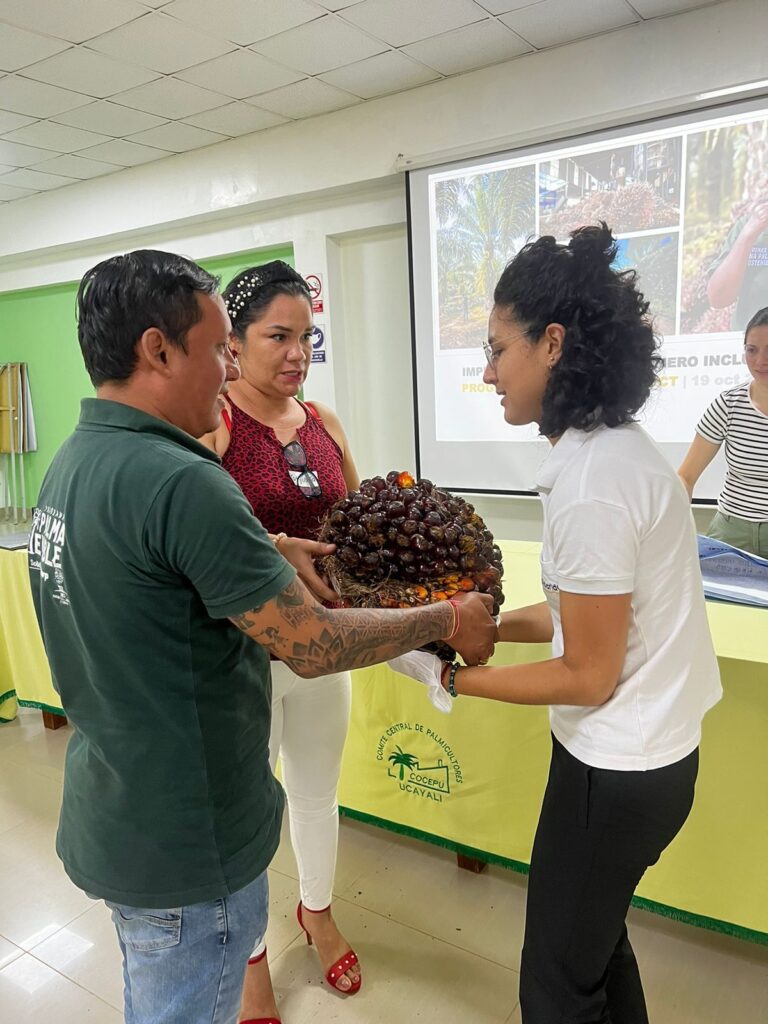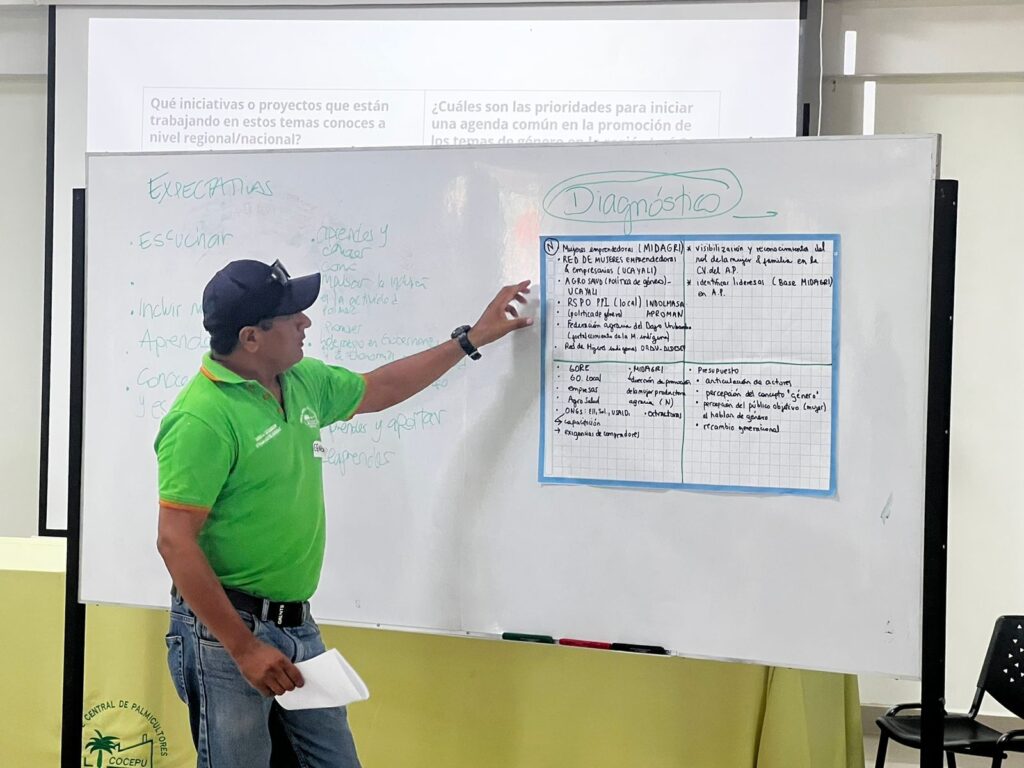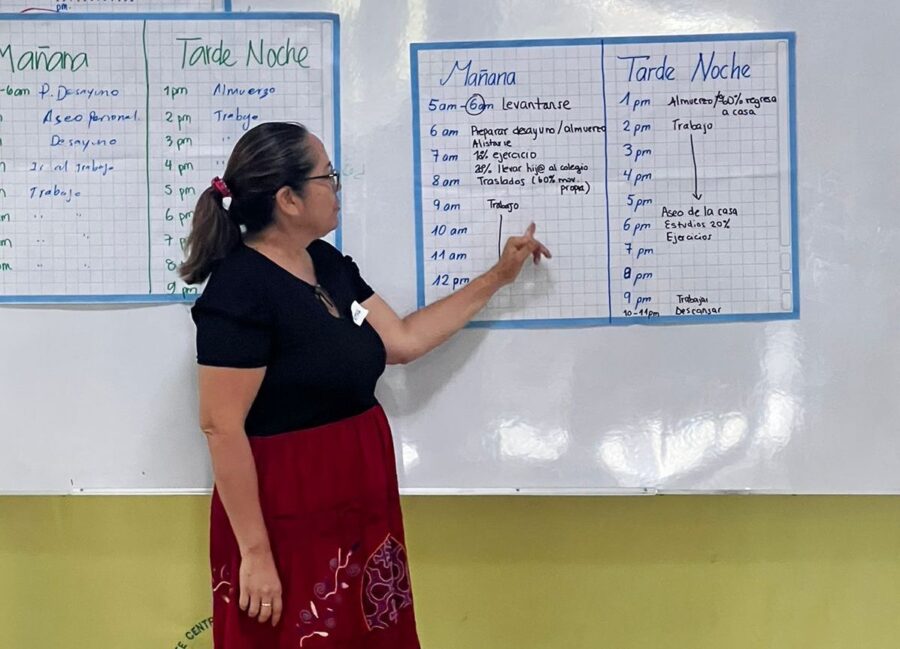Patricia Seijas, a specialist from the Earth Innovation Institute, explains the results of a time-keeping activity to help attendees understand the division of labor among families.
In Peru, there are roughly 7,000 families with small-scale oil palm farms, a large number of them in the department of Ucayali, the largest oil-producing region by volume. Although smallholders are less likely than large plantations to expand into primary forests, according to research from University of Wisconsin-Madison, they require more land area on average than industrial producers to produce the same volume.
It’s estimated that 30% of smallholder plantations have expanded into forests. Providing smallholders with the technical guidance needed to sustainably increase production and support a decent livelihood is one way to reduce pressure on sensitive and biodiverse habitats.
Solidaridad is working with 700 families belonging to two producer organizations in Ucayali through the Amazonia Connect initiative. Supported by USAID, the partnership between Solidaridad, Earth Innovation Institute (EII), National Wildlife Federation, and the University of Wisconsin-Madison promotes and scales the adoption of low-emission commodity production and rural development to improve biodiversity conservation and climate resilience in the Amazon biome.
Smallholders could support their families on the land they have without expanding their farms if they had better support.
Lesly Vera Gonzalez, Palm Oil Programme Manager at Solidaridad in Peru.
“Smallholders could support their families on the land they have without expanding their farms if they had better support,” said Lesly Vera Gonzalez, Palm Oil Programme Manager at Solidaridad in Peru. “Technical assistance to improve yield, certification and conservation are our focus in the area.”
In Ucayali, the oil palm farmers who are part of Amazonia Connect have committed to learning and promoting more sustainable and forest friendly production that can sustain their household economy and achieve their common goals of education and progress. This work will be complemented by the introduction of traceability tools to monitor deforestation risks, and the implementation of strategies supported by EII to attract financing and investment and support low-emission rural development.
“Technical job opportunities in sustainability can be a motivator for young people in palm farming families and helps avoid the need for migration,” according to Patricia Seijas, a specialist from the Earth Innovation Institute. The producers in Ucayali are currently working to achieve certification under the Roundtable on Sustainable Palm Oil, which will provide them with greater access to markets and support sustainable local development.

Expanding social inclusion in Peru’s palm oil sector
Amazonia Connect is looking beyond farming to factor in social inclusion, gender and youth norms, and the effect these have on sustainable production. Unlike other sectors in the Peruvian Amazon, for example coffee and cocoa, there is limited information available on gender dynamics and inclusion of young people in the oil palm value chain.
“Understanding the family and community dynamics is the first step towards people taking control of their own lives and decisions,” said Lucia Hidalgo, Multiprogramme Coordinator at Solidaridad Peru. “We all start from the same point at birth, but not all of us have the same opportunities and conditions to achieve our life goals.”
Solidaridad utilizes the Gender Action and Learning System (GALS) methodology, developed by the International Fund for Agricultural Development (IFAD), to address the root causes of inequity in communities. During a GALS session, attendees reflect on how inequity limits the development of their personal, family and community vision. It is a flexible and fun methodology that involves all family members.
As part of Amazonia Connect, Solidaridad is currently conducting a Gender and Youth Inclusion Assessment with representatives of the public sector, civil society, mills and smallholder organizations in the region. The assessment, scheduled to be released in March, will help facilitators to explore the understanding of and the appetite for the inclusion of gender and young people in the palm oil supply chain in Ucayali.


